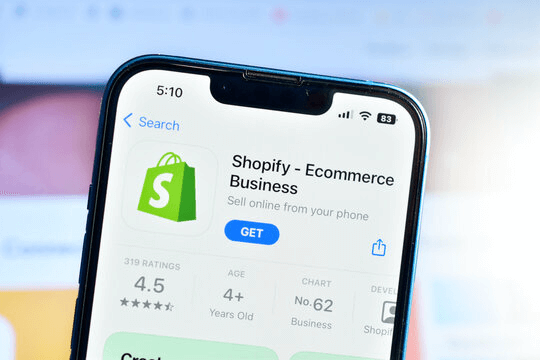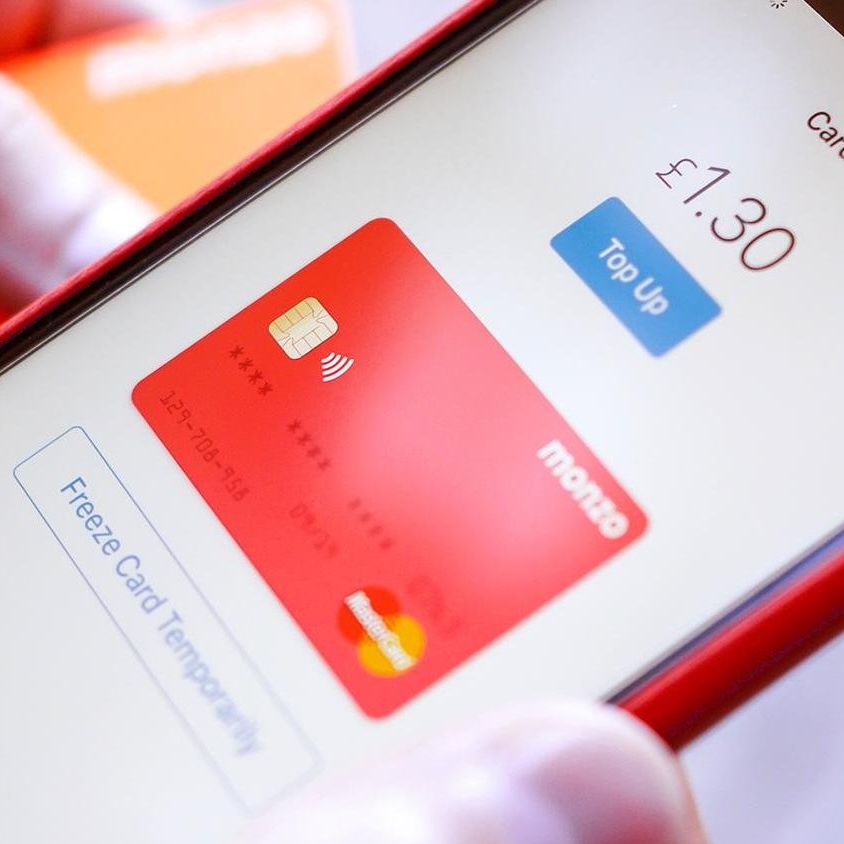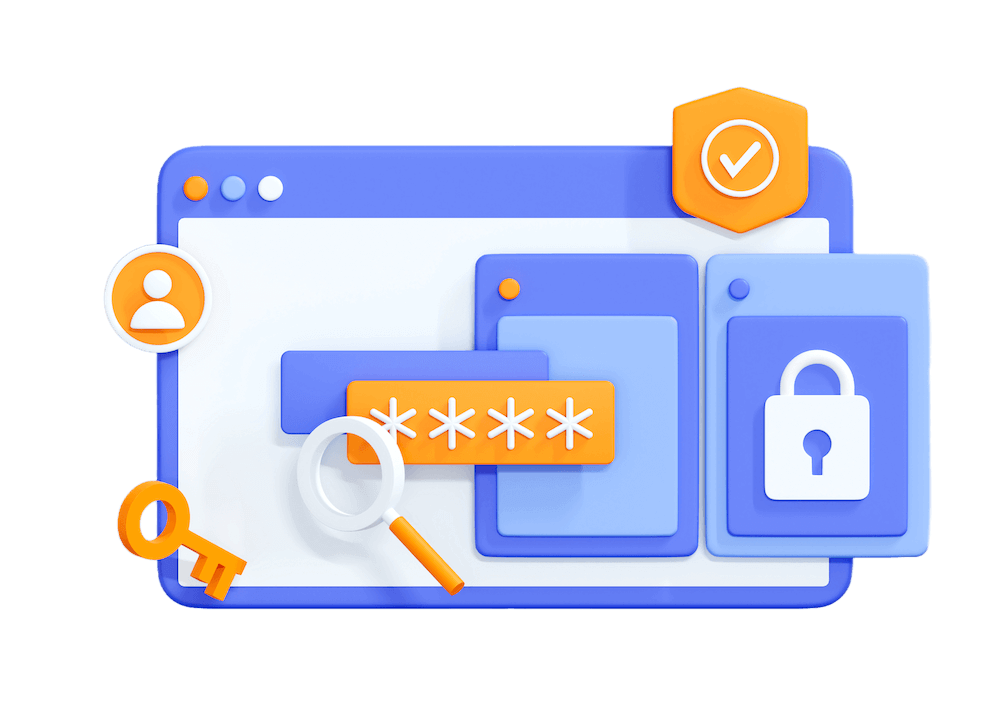
THE BEST PRIVACY AND SECURITY APPS 2024
Updated: 12/03/2024
On this page:
▸ Best privacy and security apps
▸ Protect your privacy with a prepaid card
In a world where we live much of our lives online, it’s essential that you know how to keep your personal information and data safe. There are numerous ways that cybercriminals can steal your personal and financial details if you don’t take precautionary measures.
In recent years, there’s been an increased risk of online scams and fraud, especially credit card fraud. In 2020, card theft led to a global loss of $28.65 billion. It’s all too easy to download malicious software accidentally or have your card details stolen unless you have the right protection.
We want to help you stay safe online, so we’ve found the top privacy and security apps for iOS and Android phones. Continue reading to find out how you can protect your data and secure your online accounts.
ExpressVPN
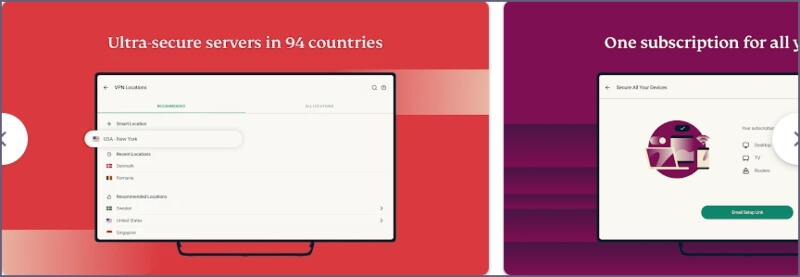
Image credit: ExpressVPN/Google Play
With server locations in 94 countries, the ExpressVPN app allows you to change your true IP address and location to anywhere else. The VPN service allows you to stream, watch and listen to content from otherwise blocked and censored websites.
The VPN protects your device from hackers when you use public WiFi networks.
For an additional fee, several advanced features exist, such as Threat Manager (to block apps communicating with malicious third parties) and Network Lock kill switch (which blocks traffic if the VPN connection drops).
Pros:
- User-friendly features make it easy to navigate
- The app is compatible with streaming services, including Netflix
- Access 24/7 support
Cons:
- Some VPNs have more features
- ExpressVPN is one of the more expensive apps
Available on: iOS & Android
Apple Store Rating: 4.7
Google Play Rating: 4.2
Cost: in-app purchases from £10.07/€11.59 to £86.99/€100.12. 30-day money-back guarantee
1password
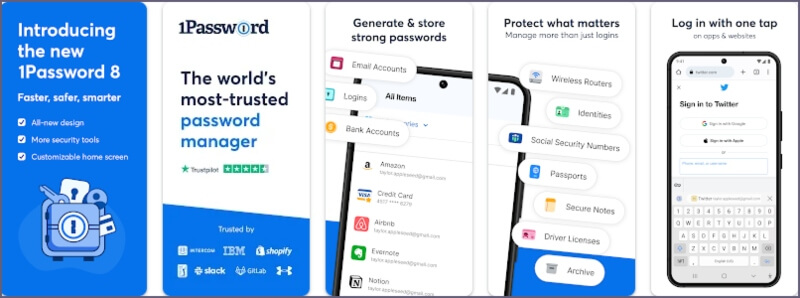
Image credit: 1password/Google Play
Remembering passwords and usernames for your online accounts can seem like a nightmare. Luckily, 1Password does all the work for you.
The app stores all your usernames, passwords and forms so that yhttps://1password.com/ou don’t have to remember each one. The password manager app can autofill the required information on each login page for a quick and easy sign-in.
You can safely share sensitive data with your loved ones, even if they don’t have an account with 1Password. With the family account, you can update shared logins and passwords across multiple devices to ensure no one is accidentally locked out.
Pros:
- Advanced encryption and two-factor authentication features
- Secret key functions
- Ideal for families and businesses
Cons:
- There’s no free plan – but new users can take advantage of a 14-day trial
- Members on lower tier subscriptions might find it hard to reach customer support
Available on: Requires operating systems iOS 14.0 or later & Android models 8.0 and up
Apple Store Rating: 3.4
Google Play Rating: 3.7
Cost: from £3.79/ €4.36 p/m for individuals to £239.99/ €276.21. Free for the first 14 days
Mcafee
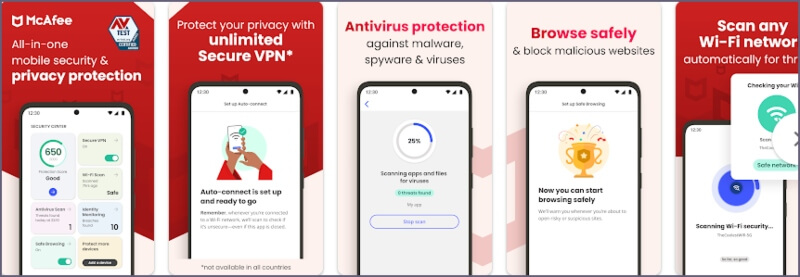
Image credit: Mcafee/Google Play
McAfee offers multiple levels of protection, such as antivirus protection, secure VPNs, and identity monitoring. You can browse the web knowing that your identity, location and device are safe from malicious software and cybercriminals.
The app has separate features to suit the different needs of iOS and Android devices. This ensures that the McAfee system can protect your device against the latest phishing and malware attacks.
The iOS version will also scan your device for the latest updates to protect your phone.
Pros:
- Try the features with a free plan before deciding to upgrade
- The interface suits beginners
- McAfee has some of the best malware protection around
Cons:
- Previous issues with data collection might put some people off
- Some apps might offer better features for less money
Available on: iOS & Android
Apple Store Rating: 4.7
Google Play Rating: 3.9
Cost: in-app purchases from £0.89/€1.02 to £189.99/€218.67
GlassWire
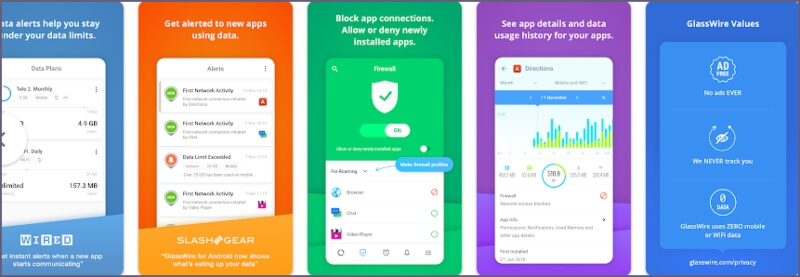
Image credit: GlassWire/Google Play
GlassWire is a network monitor & security tool. You can use the app to monitor your WiFi network activity to see which devices and apps are using your network or mobile data. The in-built firewall also blocks apps from accessing your network until you allow or deny access.
The Android app will notify you if there are any suspicious anomalies in your network traffic and abnormal data consumption. You can keep track of past and present network data via the app in an easy-to-read graph.
Pros:
- Seamless data monitoring
- Discover apps that are consuming data and remove them
- Set permissions for individual apps
Cons:
- Android has built-in data monitoring capabilities already
- The app can be prone to bugs
- It’s not available for Apple devices
Available on: Android
Google Play Store Rating: 4.6
Cost: Free version or in-app purchases from £0.89/€1.02 to £4.59/€5.28
Notesnook
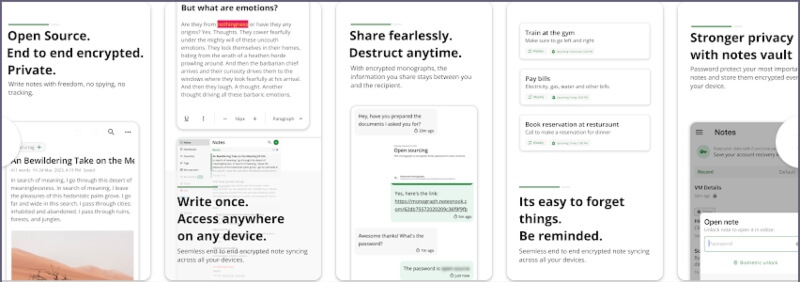
Image credit: Notesnook/Google Play
Whether you’re noting down your weekly shopping list or keeping track of a work project, the Notesnook app helps keep your notes safe with end-to-end encryption. You can save and share information with zero tracking or spying.
You can add videos, images and file attachments to your notes and export them anytime. The app will remain locked even if your device is unlocked, which stops anyone from stumbling upon your private information.
Don’t worry if you’re not connected to a network — you can make notes offline and sync them instantly when you’re back online.
Pros:
- The encryption features protect sensitive information
- Numerous formats for note-taking
- Use the free version for basic features
Cons:
- Other note-taking apps might offer more features
- Free users can’t cross-sync their devices
Available on: iOS & Android
Apple Store Rating: 4.6
Google Play Rating: 4.5
Cost: Free version or in-app purchases from £0.99/€1.14 to £52.99/€60.99
Signal Private Messenger
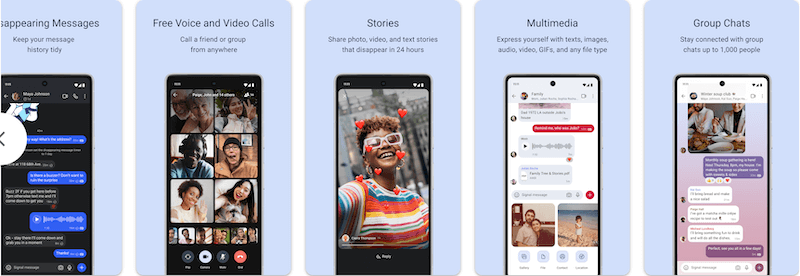
image credit: Signal Private Messenger/Google Play
Signal is an open-source messaging app that puts user privacy at its core. Unlike What’s App and other messaging applications, Signal only allows the intended reader to access the content of each message using encryption technology.
Whether you want to make private calls or send important information to others, the app offers a headache-free way. The disappearing messages feature also lets users set when a message is available.
Pros:
- Encrypted messaging offers additional security
- As an open-source platform, independent experts review its functionality
- The app is free to use
Cons:
- Signal isn’t as popular as other apps, so the user base isn’t as diverse
- The interface isn’t as intuitive as other apps
Available on: iOS & Android
Apple Store Rating: 4.8
Google Play Rating: 4.5
Cost: Free
Protect your privacy with a prepaid card
For added security, using a prepaid card when you purchase apps on the App Store or the Google Play Store is a good idea. The cards aren’t directly linked to your bank account, which means cybercriminals will never have access to your total funds.
You can only add a certain amount of money to your prepaid card, limiting the number of purchases fraudsters can make if they gain access to your card details.
If you use a credit card over public WiFi, for example, cybercriminals who have compromised the connection could hack your bank account.
On the other hand, if you use a prepaid card over public WiFi, there is no way that cybercriminals can use it to access your bank account.
You can also use prepaid cards to safely buy from thousands of online and in-store merchants, as well as through PayPal. It means you can shop safely while knowing your bank account and financial details are fully protected.
Getsby offers two types of virtual cards: our reloadable Virtual Green Card and our disposable Virtual Black card.

Virtual Green Card
- Instant delivery
- No credit check
- Apple Pay & Google Pay
- Card fee € 3.99
- Top-up: 3.0% (min € 2)
Learn more

Virtual Black Card
- Instant delivery
- No credit check
- Apple Pay & Google Pay
- Card fee € 2.99 + 3.0%
- 5 cards per day
Learn more
FAQs
What apps should not be on my phone?
Although it can be tempting to download the trendy new gaming app or a local weather app, you should be cautious. Countless apps on app stores will request access to your location, full name and other types of personal data when you download them.
The apps will then sell this information to third parties, which could risk your privacy and security.
Who can see what I do on my phone?
When you download a new app, you likely agree to the Terms and Conditions without fully understanding them. You could be giving an app access to your location, contacts, camera and microphone without realising it.
When you download a new app, you should see what permissions the app wants so that you can decide whether you’re happy to share that information. If you don’t feel happy sharing that level of personal information, it’s advisable to try and find another app to use.
How can I tell if my phone is being monitored?
The following are some tell-tale signs that your device is being monitored. However, it’s important to remember that these are indicators rather than definitive signs.
- Slow performance: Malware could be causing your phone to lag because it’s sending your data, photos and documents to an external server
- Overheating: Your phone may be overheating because malware is constantly operating in the background
- Abnormally high data usage: Hackers may be using your data to remotely access your phone to transfer your information and files to an external server
- Random reboots: A hacker may have remote access to your phone and is trying to reset the password and username for your online accounts so they can gain access
- Strange text messages: A hacker may be using your phone’s text system to communicate with their server or to encourage you to click on sinister links
Do apps collect personal data?
When you download an app, you’ll likely have to authorise the app to access personal information such as your contacts, location or documents. The apps may need access to this information to help their systems run correctly.
If you want your weather app to forecast the weather in your location, for example, it makes sense that it requests access to your location. However, the app may want access to your information to sell it to third-party companies. This could lead to spam calls or potential cyber-attacks.
To protect your online privacy and security, you must be aware of what information you allow your apps to collect.
Read the Terms and Conditions before downloading an app and assess whether you’re comfortable with the personal information it asks for.
Summary
Protecting your personal data is an essential part of having an online presence. Luckily, there are a number of iOS and Android apps that you can download that will protect you against malware, viruses and cybercriminals who may try to steal your data.
At a minimum, you should take basic steps such as using a VPN or encrypted connection when using public WiFi networks.
However, it’s advisable to use iOS and Android antivirus apps to help protect your device if you accidentally download malicious apps or click on a harmful link.
Many apps include additional security features that can offer better protection to your phone, such as password encryption and firewalls.

